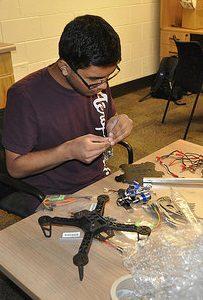
For the 37 area high school students attending ASDL’s STEP (Science Technology and Engineering Pipeline) camp, there will be no “vinegar-and-baking-soda-does-what?” experiments this summer.
The open-ended problems they are tackling come from NASA and other real-world entities. And the answers they are finding come from hard work.
"The solutions are not in the back of the book," says camp organizer, Dr. Kelly Griendling, an ASDL research engineer.
"And the engineers supervising them might not have the particular expertise that's called for, so it's a lot of problem-solving, collaborating, and trying different things."
| Brandon Ringfield, a Lithia Springs junior, has been working on this hybrid motor that he hopes to install in an UAV that his colleague, Austin Pettit is programming. The challenge, he says is to get the throtttle at the "right place" so that the engine will start quickly and keep going. |
Funded with grants from industry giants Lockheed and Boeing, STEP seeks to replicate both the challenge and the excitement faced by working engineers. That’s a winning combination for the impatient curiosity of its campers.
“I didn’t expect for it to get this real, this fast,” said Brandon Ringfield, a soft-spoken junior from Lithia Springs.
“They are letting me buy materials and try things on my own. It’s not like back at [high] school, where the teacher tells you how to do everything.”
In addition to learning some engineering fundamentals, students enrolled in STEP are learning how to collaborate, design, and execute – three skills every engineer needs to nail. They are testing materials, recording performance, and trying different strategies to make their projects successful.
And every project is different.
One team is programming a remote controlled boat; another is answering an asteroid capture challenge; two others are designing a hybrid powered UAV; another is building a quad rotor vehicle (to meet Army Research Lab specs) and the last one is comparing the performance of different rotor-engine combinations.
This is the first time that ASDL has organized the two-month engineering intensive Griendling says. That’s meant a lot of work, she says, but the value is really obvious.
“All of the students had to apply to be here -- put together a resume -- so they want to get something out of it,” she said. " And when you see students like Brandon, zeroing in on the work, soaking up new information and skills all the time, you know it’s building a good foundation.”
The camp will conclude at the beginning of August, when students present their findings. But the adventure will hopefully last a lot longer.
"We'd like to see some of these kids come to Georgia Tech," said Dr. Daniel Cooksey, another ASDL research engineer who is helping out on the project. “And this camp is giving them something to imagine, to shoot for.”
| Students enrolled in the ASDL STEP camp getting ready to deploy their remote-controlled boat on a test run. See more photos of their trial run in this slideshow. |
AE's IPLE Lab also ran a very-well attended summer camp. Check out this slide show of the TEAM Camp, which brought together high school students at Georgia Tech with high school students from Detroit, MI.